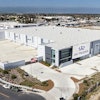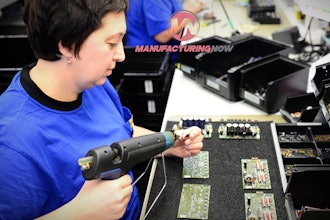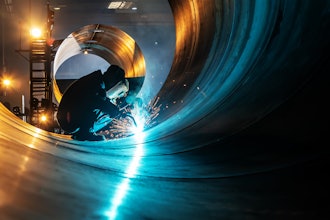DETROIT (AP) — Michigan State University has opened an experimental dairy with the latest technology, including a system that allows cows to milk themselves.
Cows step into the system when they feel a need to release milk — or when they want food the machine dispenses as treats. The machines use laser monitors to recognize cows and position suction cups to their teats.
"Cows ... come and go as they choose," said Mat Haan, operations manager at the Michigan State dairy. "If a cow decides she wants to milk at two o'clock in the morning, she can, as opposed to the farmer bringing the whole herd together and working them through the parlor in one big group."
About 1,200 people toured the dairy Wednesday, when it was opened to the public for the first time. Along with the self-milking system, visitors saw such cow-friendly features as in-pen waterbeds, rotary back scratchers and automatic manure scrapers.
Financing for the 94-cow dairy at MSU's W.K. Kellogg Biological Station in Kalamazoo County's Ross Township came from a $3.5 million 2007 grant from the W.K. Kellogg Foundation, along with university funds.
The dairy is trying out practices and technology that could "help keep small and midrange family dairy farms in business," Haan said. "It's not going to happen at 1,000 or 2,000 animal operations."
Equipment like the self-milking system can help reduce farmers' labor costs, which is important when milk prices are low, as they have been in the past year.
"It's tough for them. We've lost four dairies in the course of the last year," said Matt Leonard of Belleville, Wis.-based Argall Dairy Systems, an equipment supplier to farmers in the area southwest of Madison.
Michigan State's "pasture-based" dairy allows cows to graze outside and come in to be milked when they feel the need.
Robot milking operations have long been in use in Europe but spread only slowly in the U.S.
The two robotic milking machines at Michigan State's new dairy were made by Maassluis, Netherlands-based Lely Group. The company released its first Astronaut milking robot in 1995 and has sales of more than 7,000 in 30 countries, spokesman Els Versluis said Friday.
The other big manufacturer is DeLaval, based in Tumba, Sweden, and part of the Pully, Switzerland-based Tetra Laval Group.
Michigan State's system includes robots with sensors that collect a range of information on the animals, Haan said.
"It will measure the cow's body weight, eating behavior, milking time per quarter, total and quarter milk yield and milk quality," he said. "The farmer gets a lot of information that can be used to make management decisions."
To save energy, the barn has curtains along its side walls that are raised or lowered to control the temperature. It also was designed to make maximum use of natural light, cutting the electric bill.
For more on modern dairy farming and automation, read Food Manufacturing's recent piece on Hope Acres, a family-run dairy farm with an eye toward innovation.
Inmates Grow, Gather Veggies, To Feed Hungry
















